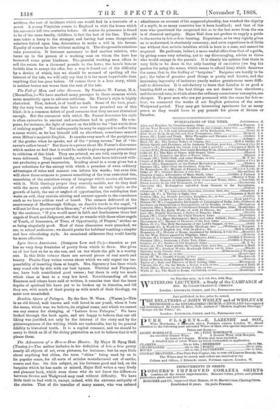The Fall of Man, and other Sermons. By Frederic W.
Farrar, M.A. (Macmillan.)---We have marked many passages in these sermons which
seem manifestly open to adverse criticism. Mr. Farrar's style is highly rhetorical. That, indeed, is of itself no fault. Some of the best, possi- bly the very best, sermons that have ever been preached are of this kind ; it is a common defect of good sermons that they are not rhetorical enough. But the ornament with which Mr. Farrar decorates his style is often excessive in amount and sometimes bad in quality. He com- pares, for instance, the light of sunset on the hills to the "last watch-fires of retiring angels." Not unfrequently he may be supposed to suffer from a cause which, as he has himself told us elsewhere, sometimes marred oven Milton's majestic English. It smacks very much of the periphrases of the gradus when he speaks, not of the " young ravens," but of "the raven's callow brood." But there is a power about Mr. Farrar's discourses which makes us feel that it would be unfair to give any great prominence to criticism of this kind. They are printed, we are told, exactly as they were delivered. They could hardly, we think, have been delivered with- out producing a great impression. Reading aloud in a room gives but a poor substitute for the energy with which a preacher of even ordinary advantages of voice and manner can inform his words ; but even this will show these sermons to possess something of the true oratorical fire, something of the resistless sweep of language which carries all hearers with it. With theology proper they scarcely meddle, nor do they deal with the more subtle problems of ethics. But on such topics as the growth of habit, the use or neglect of opportunities, the retribution that waits on evil, they contain stirring and earnest appeals to the conscience such as we have seldom read or heard. The sermon delivered at the anniversary of Marlborough College, on Jacob's words to the angel, "I will not let thee go except then bless me," of which the subject is expressed by the sentence, "If you would meet in faith and fearlessness those last angels of Death and Judgment, see that ye wrestle with those other angels of Youth, of Innocence, of Time, of Opportunity, of Prayer," strikes us as being singularly good. Most of these discourses were preached, we see, to school audiences ; we should prefer for habitual teaching a simpler and less stimulating style. As occasional addresses they could hardly be more effective.






























 Previous page
Previous page